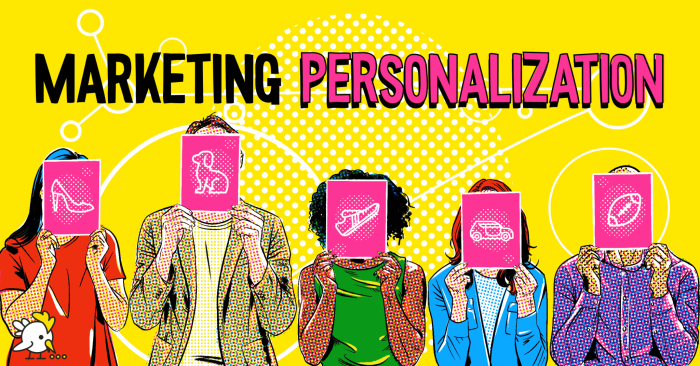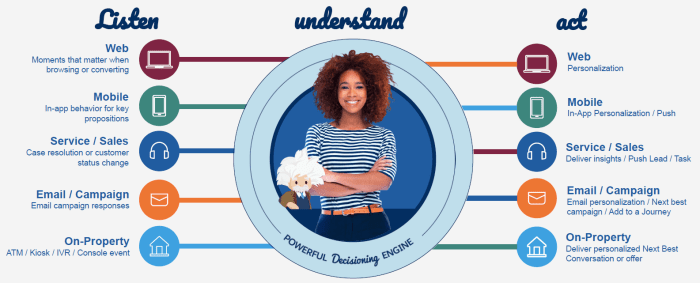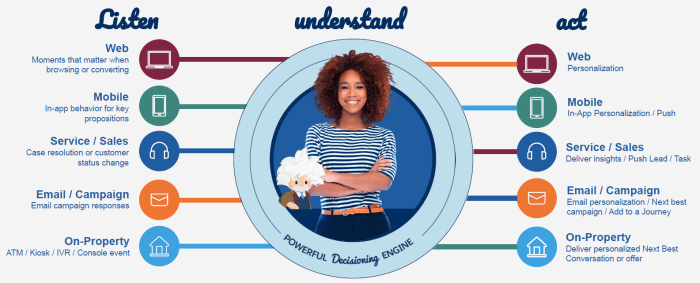Personalization in Marketing sets the stage for building strong customer relationships in a digital world. Dive into the realm of tailored marketing strategies that resonate with consumers on a personal level.
Discover the key concepts and techniques that drive successful personalized marketing campaigns, and explore the impact of customization across various marketing channels.
Definition of Personalization in Marketing

Personalization in marketing refers to the practice of tailoring marketing messages and strategies to individual consumers based on their preferences, behaviors, and characteristics. It involves using data and technology to create customized experiences that resonate with each customer on a personal level.
The importance of personalization in marketing lies in its ability to enhance customer engagement, increase brand loyalty, and drive conversions. By delivering relevant and targeted content to consumers, companies can improve the overall customer experience and build stronger relationships with their audience.
Examples of Personalized Marketing Strategies
- Amazon’s product recommendations based on previous purchases and browsing history
- Netflix’s personalized movie and TV show suggestions based on viewing habits
- Sephora’s personalized beauty recommendations using customer preferences and skin type
- Starbucks’ personalized offers and rewards through their mobile app
- Spotify’s customized playlists and music recommendations based on listening habits
Benefits of Personalization in Marketing

Personalization in marketing offers a range of advantages that can significantly impact a company’s success. By tailoring marketing efforts to individual customers, businesses can create more meaningful connections, improve customer engagement, and ultimately drive higher conversion rates.
Improved Customer Engagement
Personalization allows businesses to connect with customers on a deeper level by delivering relevant content and offers based on their preferences and behaviors. This tailored approach makes customers feel valued and understood, leading to increased trust and loyalty.
Higher Conversion Rates
When customers receive personalized recommendations or promotions that align with their interests and needs, they are more likely to make a purchase. Personalization can help businesses cut through the noise of generic marketing messages and deliver targeted content that drives conversions.
Techniques for Implementing Personalization
Implementing personalization in marketing involves various techniques to collect customer data, utilize AI and machine learning, and create personalized content for different customer segments.
Collecting Customer Data for Personalization
To effectively personalize marketing efforts, it is crucial to collect relevant customer data through various channels such as:
- Utilizing website analytics to track customer behavior and preferences.
- Implementing customer surveys and feedback forms to gather direct insights.
- Utilizing social media monitoring tools to track customer interactions and interests.
- Utilizing CRM systems to store and analyze customer data for personalized campaigns.
Use of AI and Machine Learning in Personalized Marketing, Personalization in Marketing
AI and machine learning play a significant role in personalization by:
- Utilizing predictive analytics to anticipate customer behavior and preferences.
- Automating personalized recommendations based on customer interactions and past behavior.
- Implementing chatbots for personalized customer service and assistance.
- Optimizing marketing campaigns in real-time based on AI-driven insights.
Creating Personalized Content for Different Customer Segments
To create personalized content for different customer segments, marketers can:
- Segment customers based on demographics, behavior, and preferences.
- Personalize email marketing campaigns with dynamic content based on customer data.
- Utilize personalized product recommendations on e-commerce websites.
- Create tailored content for specific customer segments on social media platforms.
Personalization Across Different Marketing Channels
Personalization plays a crucial role in marketing across various channels, allowing businesses to connect with their audience on a more individual level. Let’s explore how personalization can be effectively applied in email marketing, social media marketing, website content, and user experience.
Email Marketing
- Utilize the recipient’s name in the subject line or body of the email to create a sense of personal connection.
- Segment your email list based on demographic data, purchase history, or behavior to send targeted, relevant content.
- Recommend products or services based on previous interactions to increase engagement and conversions.
Social Media Marketing
- Address your audience directly by using personalized messaging and responding to comments or messages promptly.
- Create tailored content for different audience segments to increase relevance and engagement.
- Run personalized ad campaigns based on user interests, behaviors, and demographics to boost ROI.
Website Content and User Experience
- Personalize the homepage based on user preferences, location, or past interactions to enhance user engagement.
- Recommend products or content based on user browsing history to drive conversions and increase time spent on the site.
- Create personalized landing pages for different audience segments to improve conversion rates and user satisfaction.
